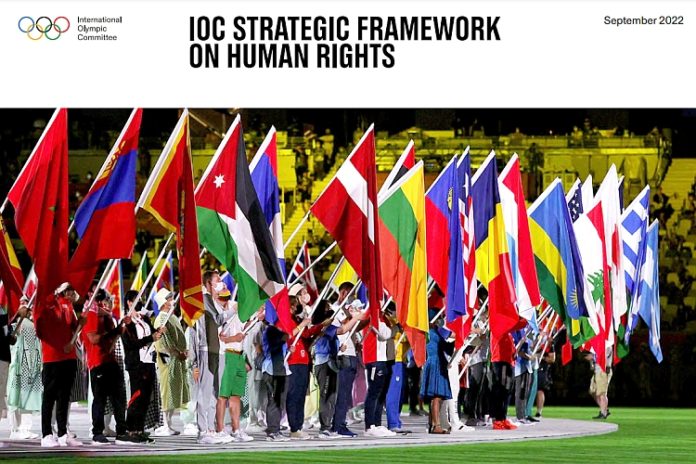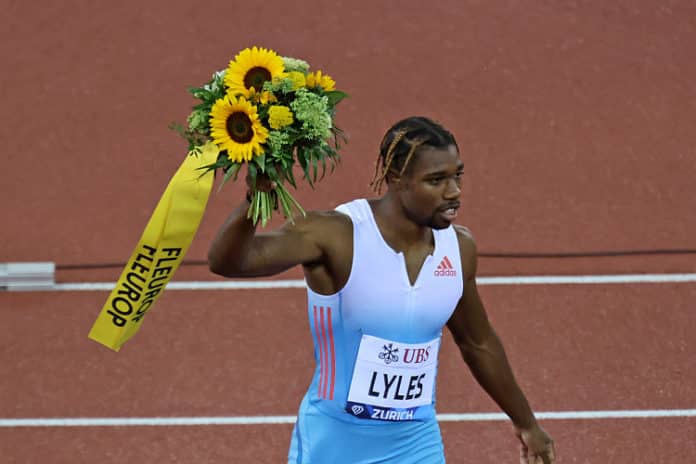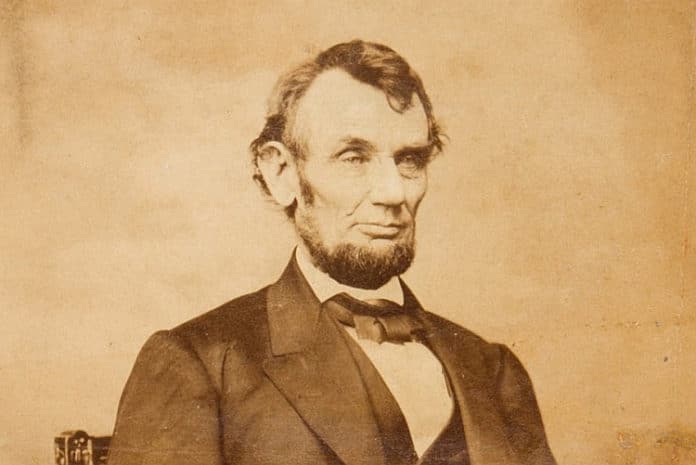★ The Sports Examiner: Surveying, monitoring and explaining the key competitive, economic and political forces shaping elite sport and the Olympic Movement. ★
★ To get The Sports Examiner by e-mail: sign up here! ★
≡ THE 5-RING CIRCUS ≡
1. Bach: Olympics must be younger, more digital, sustainable, modern
2. IOC introduces “Strategic Framework on Human Rights”
3. Int’l Boxing Association “concerned” and “surprised” by IOC criticism
4. Munich ‘72 U.S. basketball team and IOC still at odds over silver medals
5. Belgium’s young star Evenepoel wins La Vuelta by 2:02
While pumping up the excitement for the Paris 2024 Olympic Games, International Olympic Committee President Thomas Bach (GER) continues to re-shape his organization and the Games. He announced a powerful new “Games Optimization Working Group” to continue making the event “even younger” and “more digital.” In addition, the IOC Executive Board adopted the 50-page “Strategic Framework on Human Rights,” but asked about how this commitment matched up with hosting the 2022 Winter Games in China, he referred to the IOC’s Host City Contract. The International Boxing Association, not on the program for 2028 and slammed by the IOC again, posted an unhappy reply and says it has followed the IOC’s recommendations for reinstatement clearly and cleanly. A request by the 1972 U.S. men’s basketball team to have its “silver medals” given to the Naismith Memorial Basketball Hall of Fame was turned down by the IOC, which insists that the only way for the medals to be awarded is for the players to accept them. That’s not happening. Belgium’s 22-year-old Remco Evenepoel won the final Grand Tour of 2022, the 21-stage Vuelta a Espana, becoming the first Belgian winner in 45 years.
1.
Bach: Olympics must be younger,
more digital, sustainable, modern
The drumbeat for Paris 2024 has already started, as evidenced by the comments from International Olympic Committee President Thomas Bach (GER) at Friday’s news conference following two days of Executive Board meetings:
“We are very much looking forward to this, hopefully, first post-pandemic Olympic Games, which will be more urban, younger, inclusive, sustainable Olympic Games, and the first gender-balanced Olympic Games in history, and they will be the first Olympic Games which are planned, ready and organized and in the best sense of the word, celebrated, in full alignment with Olympic Agenda 2020.”
He was especially enthused by the revolutionary idea of the Opening Ceremony to take place on the Seine River:
“The Olympic Games are already, now, a once-in-a-lifetime experience, but having this Olympic experience, this will really be unique and a moment, I think, nobody of them will ever being on this boat and being welcomed and cheered on by up to 600,000 people on the river.”
And no worries about security? “We can really say we have full confidence in the French security authorities.”
However, excitement for 2024 has hardly tempered Bach’s continuing reform program of the IOC and the Games. Building off of the difficult re-programming of the Tokyo Games for a year’s delay, the economic issues plaguing Paris and Milan Cortina 2026 and Bach’s view of the future of the Olympics, the new “Games Optimization Working Group” was formally announced:
“It was about the organization of the Olympic Games, the optimization of the organization, meaning to adapt the organization of the Olympic Games to modern times, to our challenges … in particular on the financial and economical side, but also to make them even younger, to make them more digital, and on this behalf, we have created a Games Optimization Working Group.
“This Working Group consists of the major stakeholders: you have there executives from the different organizing committees, you have the presidents of the associations of the winter sports federations and the summer sports federations, you have the representatives from the National Olympic Committees and from the Paralympic Committee. There are media partners, press, TOP Partners, and, of course, our Olympic Games Department. And this extremely important working group is chaired by Kirsty Coventry [ZIM], who also chairs the Coordination Commission for the Olympic Games Brisbane 2032.”
Bach noted that the group had already had its first meeting, and he was clear about its direction: “we want to make the Games more feasible, more sustainable and more modern, for the best athletes of the world to shine.”
He then introduced an even broader project, dealing with the IOC’s embrace of human rights as outlined by the United Nations (more below). But there were also questions about the future, especially the selection of the host for the 2030 Olympic Winter Games, in view of Thursday’s announcement of the delay of the 2023 IOC Session in India to September or October, at which the 2030 host is to be confirmed.
Ask specifically if the delay in the Session means the identification of a single potential host – Sapporo, Salt Lake City or Vancouver – won’t be made in the projected December time frame, Bach punted:
“This will be in the hands of the Future Host Commission to see whether they still want to come to the [Executive Board] in December or at a later stage. … This is in their hands.”
2.
IOC introduces “Strategic Framework on Human Rights”
Bach is a clear admirer of the United Nations and especially its goal-setting programs, and has now tethered the IOC and the Olympic Movement to the United Nations Guiding Principles on Business and Human Rights, introduced in 2011.
The 50-page IOC Strategic Framework on Human Rights, introduced on Friday, is considered by Bach to be a central element in the future of the Olympic Movement:
● “This Framework will fundamentally shape the working practices of the IOC, the Olympic Games, and the entire Olympic Movement, ensuring that human rights are respected within our own respective remit.”
● “The overarching mission of the Olympic Movement, as you know, is for sport to contribute to a better world … It will address selection of future Olympic Games hosts and the delivery of the Olympic Games.”
● “What is clear … is the [host city selection] procedure, and there, you can see from this Human Rights Framework that the Future Host Commission, which is leading this process, will be guided by the U.N. [Guiding Principles].”
So what does this mean? The Framework sets out three limited “spheres of responsibility” for the IOC: for its own organization, for the organization of the Olympic Games and as leader of the Olympic Movement, with influence over the International Federations and the National Olympic Committees. The Framework is careful to set out these limits on the IOC’s view of its own purview, but within it are five priorities:
● Equality and non-discrimination
● Safety and well-being
● Livelihood and decent work
● Voice
● Privacy
And these areas will be applied to four target audiences:
● Athletes
● IOC/IF/NOC and organizing committee workforce
● Workers in supply and value chains
● Olympic-related communities
The IOC’s immediate goals for 2024 include 16 objectives, including internal actions such as amending the Olympic Charter and applying social and environmental standards to the IOC’s own supply chain. For future Olympic Games, the IOC plans to ask more questions and impose more oversight on bid cities and host cities, including prevention, mitigation and remediation measures.
(This is not new; FIFA is already doing this, and has asked each venue city for the 2026 World Cup in Canada, Mexico and the U.S. about this topic in detail.)
Issues of safeguarding – especially of very young athletes – and of freedom of the press to report at the Games without constraint are mentioned specifically.
With the broader Olympic Movement, the objectives focus on best-practice sharing, encouragement and monitoring, especially regarding athlete involvement and safeguarding from abuse at the IF and NOC levels.
So with all of this attention to human rights, what does Bach and the IOC have to say about February’s Winter Games in Beijing, especially in view of the 31 August human rights assessment by the U.N. Human Rights Office of China’s actions in Xinjiang regarding the Uyghur population? The report found “Serious human rights violations have been committed in XUAR in the context of the [Chinese] Government’s application of counter-terrorism and counter-‘extremism’ strategies.”
Said Bach:
“We have, of course, taken note of this report. With regards to the Olympic Winter Games Beijing 2022, which fall within our remit, the IOC worked together with the organizing committee to ensure that all the obligations in the Host City Contract were met, and if you read the report by the U.N. High Commissioner and you look into the recommendations which are directed to the wider society, there is the call, therefore, for respect of the U.N. [Guiding Principles], and this is what we are doing.”
Observed: The key here is Bach’s view of the limits of the IOC’s authority, which extends to the Olympic Games and no further. His repetition of the position that the Chinese organizers met the requirements of the Host City Contract is itself an admission that there was more than could have been done, but that was impossible in dealing with a world power on an event staged within its country.
Whether the IOC’s new human-rights program becomes meaningful, influential or worthwhile will very much depend on the credibility of the choices of the future host cities. For 2024, 2026, 2028, 2030 and 2032, a significant challenge is not expected. What happens beyond is unknown and will be up to Bach’s successor.
3.
Int’l Boxing Association “concerned” and “surprised”
by IOC criticism
The IOC Executive Board issued a stinging rebuke to the International Boxing Association last Thursday, with a letter that stated:
“Boxing is currently not included in the sports programme of the Olympic Games Los Angeles 2028. Considering the absence of a real evolution, the IOC Executive Board is not in a position to reverse this decision and will continue to monitor with grave concerns IBA’s governance.”
The IBA was upset, to say the least. In a Friday post, the federation:
● Complained that the qualification process that the IOC threw out and replaced with its own program was developed in part with the IOC, and:
“Neither is IBA aware of consultations made by the IOC with key IBA stakeholders, including IBA technical committees and IBA Athletes Committee, whilst it is claimed that the new qualification process puts boxers first.”
The IOC was highly critical of the thinning of the IBA’s supposed administrative headquarters in Lausanne in favor of what it called an expanding “Presidential office in Moscow” to support IBA chief Umar Kremlev, a Russian. The IBA’s reply: “the staff restructure of the Lausanne office was a necessary process for its continued smooth operation moving forward …”
● With regard to refereeing and judging:
“The perceived double standard approach relating to the joint assessment work in the technical officials space remains extremely disappointing. … Our work in the integrity space has already had a significant positive impact on results coming out at world level competition [IBA Women’s World Boxing Championships in Istanbul]. Trust is extremely important whilst working together in the team environment; positive feedback has been prevalent during this time, so it remains really difficult and disappointing to understand the sudden change in tact and direction.”
● As to governance:
“The newly formed IBA has moved away from the issues of the past. The organization has a new democratically elected Board of Directors, and it is a totally new entity … The forthcoming congress will dispel the myth and all doubts over IBA’s commitment to good governance.”
● As to IBA finances, which the IOC specifically criticized as leaning on the Russian state-owned energy giant, Gazprom, the IBA post stated:
“We believe that the IOC is not well-informed regarding the current financial state of IBA, but we remain open to any request for shared information. … we have agreements made with two main sponsors.”
The IOC has not been impressed.
The IBA’s own election processes have been less than perfect and the Court of Arbitration for Sport ordered the federation to hold a special Congress to determine if a re-run of the Presidential Election is to be held. That Congress will be held on 25 September in Yerevan (ARM), and the IOC stated that will be watching closely.
4.
Munich ‘72 U.S. basketball team and IOC still at odds
over silver medals
“Today is the 50th anniversary of the most controversial Olympic game ever – the US vs Soviet basketball game at the Munich ’72 Olympics. Here I am celebrating our win and then the refs took the game away from us. Till this day, we have never accepted the silver medals.”
Former Maryland star and later three-term Congressman Tom McMillen’s tweet on Friday commemorated a game whose outcome is disputed a half-century later, and is still not fully concluded.
The U.S. team refused to accept the silver medals after “losing” the Olympic final to the USSR, 51-50. The game initially ended with the U.S. winning, 50-49, but the final seconds were replayed twice more, with the Soviets finally making a basket off a long pass and officials declaring the game over.
The American position has not budged since and forward Ed Ratleff told The Associated Press, “I’m not taking it and I’m sure 100% we got cheated out of it and I think they knew that, too.”
McMillen asked the International Olympic Committee if the silver medals could be sent to the Naismith Memorial Basketball Hall of Fame, but the answer was no, with a spokesman saying, “The IOC expressed its appreciation for his efforts but felt that appointing an attorney to accept the medals would not be appropriate.”
In other words, if they players won’t accept them, they won’t be awarded.
Said McMillen: “[W]e say, ‘We don’t want these, we don’t think we deserve them, we think we deserve the gold. But I think everybody’s got different views. I mean, it’s really hard, so it’s probably going to stay the way it is.”
5.
Belgium’s young star Evenepoel wins La Vuelta by 2:02
Belgium’s Remco Evenepoel weathered the last two climbing stages on Friday and Saturday and rode into Madrid on Sunday with the biggest win of his career in the 77th La Vuelta a Espana. Evenepoel finished the 21 stages in a cumulative time of 80:26:59, a clear winner by 2:02 over Spain’s Enric Mas and 4:57 over Juan Ayuso (ESP).
After three-time defending champion Primoz Roglic (SLO) was injured at the end of Stage 16, only Mas had a shot at the 22-year-old Belgian, whose most important victory had been the venerable, one-day Liege-Bastogne-Liege race in April.
On Friday, the 138 km route had two major climbs, but ended on a long, gentle downhill, so it finished in a mass sprint with Denmark’s Mads Pedersen claiming his third stage win in 3:19:11, ahead of Fred Wright (GBR: fifth top-4 finish!) and Gianni Vermeersch (BEL), with Evenepoel 40th (same time).
Saturday’s challenging five-climb, 181.0 km route to Puerto de Navacerrada was a third stage win for Ecuador’s Tokyo Olympic road race champ Richard Carapaz. He took over on the final climb and soloed to the finish across the final 7 km. A late challenge from Thymen Arensman (NED) earned him second (+0:08), with Ayuso (+0:13) third and Evenepoel sixth (+0:15).
That left the Belgian 2:07 up on Mas going into Sunday’s 96.7 km parade into Madrid. The expected mass sprint finish saw Juan Sebastian Molano (COL) edge Pedersen and Pascal Ackermann (GER) at the line with both timed in 2:26:36. Evenepoel finished 40th, 11 seconds behind the winner.
Evenepoel’s victory is the eighth by a Belgian at La Vuelta; seven men have won, but not since Freddy Maertens back in 1977. Gustaaf Deloor (1935-36), Edward van Dijck (1947), Frans de Mulder (1960), Ferdinand Bracke (1971) and the great Eddy Merckx in 1973 were the others, and now Evenepoel.
¶
The eighth Ceratizit Challenge by La Vuelta for women also ended Sunday with Dutch star Annemiek van Vleuten defending her 2021 title in style, winning the second stage and finishing in the top 10 in four of the five stages.
Van Vleuten finished 1:44 in front of Italy’s Elisa Longo Borghini, and 2:11 up on fellow Dutch star Demi Vollering. After the opening team time trial and van Vleuten’s win in stage 2, the races were won by Grace Brown (AUS), Silvia Pesico (ITA) and Elisa Balsamo (ITA) on Sunday.
Van Vleuten has had a season to remember as the absolutely dominant women’s rider, winning the Giro d’Italia Donne, the revived Tour de France Femmes and the Ceratizit Challenge. She also won two important one-day Classics in February’s Omloop Het Nieuwsblad and Liege-Bastogne-Liege in April. At 39, she shows no signs of being done. Next up: the World Road Race Championships in Australia.
≡ WORLD CHAMPIONSHIPS ≡
● Rugby Sevens ● The quadrennial Rugby World Cup Sevens saw familiar teams at the top of the podium as Fiji and Australia won the men’s and women’s tournaments, held at Cape Town (RSA).
The Fijians, previous winners in 1997 and 2005, were hardly challenged, winning their Round of 16 match by 29-5 over Wales, then 21-10 over Samoa, 39-14 against Australia and the final by 20-12 over two-time defending champion New Zealand.
Ireland won the third-place match by 19-14 over Australia.
The women’s tournament was another match between the only two teams to win the title: 2009 champ Australia vs. 2013-18 champ New Zealand. The Australians won their matches by 48-0, 35-5 and then 17-7 against the U.S. in the semifinals, while the Kiwis won by 47-5, 28-0 and 38-0 vs. France.
The final figured to be a fight and it was, with Australia leading, 12-10, at the half. The Aussies got tries from Faith Nathan and Maddison Levi to expand the lead to 24-10, but then held on as New Zealand scored twice, but missed a conversion and fell short, 24-22.
In the third-place match, France easily defeated the U.S., 29-7. It was the second straight medal for the French (second in 2018) and the second consecutive fourth-place finish for the U.S.
● Volleyball ● Poland looked set to ace a third consecutive FIVB men’s World Championship before home fans in Katowice, but it was Italy that won a fourth men’s world title with a 22-25, 25-21, 25-18 and 25-20 win. The Italians had previously won in 1990-94-98 and this was its first medal since then.
Italy’s Simone Giannelli was named Most Valuable Player and Best Setter in the tournament. The Italian team won $200,000 as the champions, with Poland receiving $125,000 and Brazil, $75,000.
In the semifinals, Poland played a dramatic, five-set thriller against Brazil, losing the first set by 23-25, then winning the next two sets (25-18, 25-20), losing set four (21-25) before finally winning the fifth set by 15-12. Italy, on the other hand, swept aside Slovenia, 25-21, 25-22, 25-21.
In the third-place match, Brazil sailed past Slovenia in four sets, winning 25-18, 25-18, 22-25, 21-18. It’s Brazil’s seventh straight medal at the Worlds, but the first time since 1998 that it has not been in the championship final. The U.S., which was eliminated in the quarterfinals, finished sixth.
● Wrestling ● The UWW World Championships are underway in Belgrade (SRB), with the first four of 30 world titles decided on Sunday, all in Greco-Roman.
At 52 kg, 2018 World Champion Eldaniz Azizli won his second career gold with an 8-0 shutout of 2019 World Champion Nugzari Tsurtsumia (GEO); American Max Nowry was fifth.
Former Iranian star Ali Arsalan (SRB) won the 72 kg division over 2022 European bronze medalist Ulvi Ganizade (AZE), 7-4; Tokyo Olympic silver medalist Akzhol Makhmudov (KGZ) also won, 8-0, over 2020 European runner-up Zoltan Levai (HUN) at 77 kg, and Zurab Datunashvili won a second gold for Serbia by defending his 2021 world title, 6-2, over Turpal Bisultanov (DEN).
≡ PANORAMA ≡
● Athletics ● The elite track & field season is almost, but not quite, over. At the Hanzekovic Memorial in Zagreb (CRO), the Saturday men’s shot put featured another showdown between Olympic and World Champion Ryan Crouser of the U.S. and countryman and two-time World Champion Joe Kovacs.
Kovacs had won the last two meets, but Crouser was better this time, reaching 22.19 m (72-9 3/4) in the fifth round to take back the lead from Kovacs, who opened with 21.95 m (72-0 1/4) but did not improve.
On Sunday, Americans scored eight wins, starting with Marvin Bracy in the men’s 100 m (9.97); Woody Kincaid in the 3,000 m with a final lean at the line in 7:38.83; a sweep in the 110 m hurdles for Grant Holloway (13.19), Freddie Crittenden (13.31) and Robert Dunning (13.36), and C.J. Allen in the 400 m hurdles in 49.10.
Shania Collins won the women’s 200 m in 22.80, Olivia Baker and Elise Cranny were 1-2 in the women’s 800 m in 2:00.16 and 2:00.49; Tonea Marshall took the 100 m hurdles in 12.74 and Ariana Ince got a lifetime best in the javelin at 64.38 m (211-3), now no. 4 on the all-time U.S. list.
Croatia’s two-time Olympic champ Sandra Perkovic got a season’s best of 68.46 m (224-7) to edge Tokyo Olympic champ Valarie Allman of the U.S. (67.55 m/221-7) in the women’s discus, and Sam Mattis was second (67.19 m/220-5) in the men’s discus.
Just one more meet on the European portion of the World Athletics Continental Tour, the Gala dei Castelli in Bellinzona (SUI) on Monday, with another good field expected.
¶
Many of the middle-distance stars from the Diamond League Final in Zurich made the long flight to New York for Sunday’s Fifth Avenue Mile, held in rainy conditions and with a special race to remember the 9/11 terrorist attacks on the World Trade Center.
The women’s mile was a breakaway performance for British star Laura Muir, who simply ran away from everyone after halfway. No one responded to her attack and she won easily in 4:15 (4:14.8), setting a race record. Well back were Nikki Hiltz (USA: 4:17), Eleanor Fulton (USA: 4:18) and defending champ Jemma Reekie (GBR: 4:18).
The men’s race was much tighter, but was another British win, this time for World 1,500 m Champion Jake Wightman, who concluded his best-ever season with a 3:50 (3:49.6) victory, defending his 2021 win and his third win in this race (also 2018). Fellow Brit Jake Heyward was second (3:50) and American Sam Prakel was third (3:51).
¶
Easily the oldest nation vs. nation dual meet still contested in the annual Sweden vs. Finland dual meet, held 4-5 September in Helsinki’s historic Olympic Stadium.
The “Finnkampen” as the meet is known was a sweep for the Swedes, who won the men’s match by 227 1/2-204 1/2 and the women meet by 225 1/2 to 205 1/2.
Finland retains the overall lead in the men’s series – which started in 1925 – at 46-36 – while the Swedish women extended their series lead to 42-25 (first in 1953).
The top mark was Swede Daniel Stahl’s win in the men’s discus at 65.54 m (215-0).
National dual meets are an excellent promotional avenue for the sport, but have been mostly (although not totally) discarded in the U.S. since the close of the USA-USSR series that ran from 1958-85.
● Basketball ● In a battle of undefeated teams, Argentina edged Brazil, 75-73, in the final of the 19th FIBA AmeriCup, the quadrennial continental championship, played in Recife (BRA),
Both teams were 5-0 and the Argentines, two-time prior winners in 2001 and 2011, ran out to a 48-38 halftime lead. But Brazil, playing at home and four-time champs, roared back in the second half, and the game was tied in the fourth quarter at 67 and Brazil had a 73-71 lead with 1:28 to play. But a Marcos Delia dunk and a Gabriel Deck layin made the different for Argentina, which scored only eight points in the fourth quarter; Deck led all scorers with 20.
The defending champion U.S., with a squad of G League and foreign league players, won the bronze medal, 84-80, over Canada, overcoming a sluggish, 29-point first half and piling up a 55-44 edge in the second. Forward Gary Clark shot 8-11 from the field and led with Americans with 18 points, by far his best game of the tournament. Guard Zylan Cheatham had 16 and guard Craig Sword added 11.
In the semifinals, Brazil defeated Canada by 86-76, building a 67-54 lead after three quarters and holding on with 19 points from 6-7 forward Leonardo Meindl. Argentina defeated the U.S., 82-73, led by 30 points from 6-8 forward Deck on 9-13 shooting from the field.
Behind by 58-52 at the start of the fourth quarter, the U.S. got the lead at 64-63 with 5:49 left, but Argentina went on 17-7 run in the final five minutes for the win. Guard Norris Cole once again led the U.S. with 18 points.
● Curling ● The World Curling Federation selected a new President after 12 years, electing American Beau Welling with 52.7% of the vote in the second round during its 11th General Assembly in Lausanne (SUI).
Welling, a golf course designer and developer from South Carolina, was the leading vote-getter in round one and then took a majority of 127 votes in round two, to 73 for Hugh Millikin (AUS) and 41 for Graham Prouse (CAN). Welling, a WCF Board member since 2018, replaces Scotland’s Kate Caithness, who served as the federation chief for 12 years.
Welling is now the second American heading an International Federation, joining David Haggerty, the President of the International Tennis Federation.
● Football ● The newest bid for the FIFA World Cup 2030 is a three-nation project among Greece, Egypt and Saudi Arabia.
Such an effort, no doubt to be underwritten primarily by the Saudis, would place the World Cup once again in the fourth quarter of the year to accommodate the heat of the Middle East, similar to the situation for Qatar in 2022.
It’s the fifth known bid effort for 2030, with Portugal and Spain ready to work together, as well as a four-nation possibility from Romania, Greece, Romania and Serbia.
A South American bid to mark a century since the first World Cup in Uruguay in 1930 also in formation, with the best-known concept a shared project with Argentina, Chile, Paraguay and Uruguay. Morocco, which has bid five previous times, is also interested for 2030.
Historically, the World Cup has never been away from Europe for more than two editions. After the 2022 event in Qatar, the 2026 World Cup will be in Canada, Mexico and the U.S., making Europe a likely destination for 2030.
● Surfing ● Brazil triumphed once again in the men’s division, but it was Australia’s Stephanie Gilmore who headlined the World Surf League Finals off San Clemente, California.
Now 34, Gilmore had to defeat Olympic Champion and five-time pro tour world champ Carissa Moore (USA) for the 2022 crown, 15.00-10.90 and 15.23-11.97. It’s Gilmore’s eighth world pro title, after wins 2007-08-09-10-12-14-18; that’s the most ever among women, breaking a tie with fellow Australian Layne Beachley with seven between 1998-2006.
The men’s title went to first-time winner Filipe Toledo, who defeated the 2019 winner, Italo Ferreira (BRA) in the final, 15.13-14.97 and 16.50-14.93. It’s the fourth title in a row for a Brazilian and six of the last eight.
¶
You can receive our exclusive TSX Report by e-mail by clicking here. You can also refer a friend by clicking here, and can donate here to keep this site going.
For our updated, 620-event International Sports Calendar for 2022 and beyond, by date and by sport, click here!





















